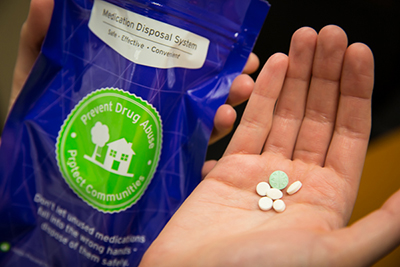

Author: Shaun Ajay
Patients recovering from surgery are typically prescribed opioids for pain control and faster recovery, but over the past decades, the dosage prescribed to patients have increased, even for procedures associated with little pain. Previous studies have shown that up to 70% of these patients end up with leftover medication that are often stored in unsecure locations or shared with others.
Saving unused opioids for future use or sharing with family or friends can lead to accidental overdoses by children or addiction. A home disposal kit provides our patients with a safe and easy way to dispose of opioids in the privacy of their home.
A study led by Sean Stokes, MD, at University of Utah Health and published in the Journal of Surgical Research was designed to test whether distributing free home disposal packets would increase the likelihood that patients would throw away excess opioid medications.
A survey to determine how patients controlled pain at home, their satisfaction with overall pain control, and risk factors for excessive opioid use was taken by 571 study participants. The patients then documented how they managed excess opioids, and whether they used the disposal kits.
Survey results showed that providing patients with home disposal kits greatly reduced their likelihood of having excess opioids at home. 82% of patients given kits used them to dispose of their excess medications.
To use the kit, patients place the pills into the bag, add water, seal the top and shake. The kit contains a neutralizing agent that renders the medicine unusable when mixed with water. Patients can then safely deposit the kit with the neutralized medications in the trash at home.
Appropriate disposal methods for opioids should also be coupled with reduced prescriptions, says Lyen Huang, MD, assistant professor of surgery at U of U Health and the senior author of this study.
More research needs to be done on how to increase the rate of disposal of these opioids and to understand the motivation of patients to save leftover medications. Patients have reported in this study that there is a sense of future need, difficulty in obtaining refills, and the lack of awareness on the dangers of unsecure opioids.
“There is also a need to understand the context of different regions affected. Rural communities in the mountain west are disproportionately affected with opioid addiction because of a proper lack of resources for disposal,” said Huang. Huang hopes to address this need in partnership with the large network of U of U Health regional affiliate clinics.